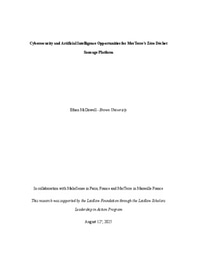Week 2: Adjustments and Figuring Things Out
Week 2: Adjustments and Figuring Things Out
As we transition into week two of my Central LiA Project with MakeSense, it has been all about settling into my role and figuring out how I can best contribute to the overall project goals. The first week was all about getting to know the team and understanding the bigger picture. Now, it is time to focus on the deliverables, which are starting to shape the direction of our work.
One of the key deliverables for this project is a deep dive into the international benchmarks related to diffuse abandoned waste. Specifically, we have been asked to analyze projects, research, and legislation surrounding waste management in different parts of the world. Given the complexity and scale of the task, it has been crucial for me to narrow my focus on areas where I can bring the most value. I have decided to zero in on the data analytics side of things and the legislative benchmark, which involves researching international laws and regulations around waste management and their impacts on biodiversity and human health.
What went well?
One of the highlights of this week has been getting a clear sense of how I fit into the project. With the guidance of my mentors Emma Lempereur and Jade Thiebaut, I was able to focus my efforts on analyzing data from past projects while keeping an eye on potential improvements for the Zéro Déchet Sauvage participatory science platform. Diving into the international benchmark of projects has been eye-opening. I have been researching similar initiatives in other cities and countries that focus on reducing waste, which has given me insights into what is working elsewhere and how we can adapt those methods to our project.
Another part of my role this week involved looking into the scientific research surrounding plastics and their impact on the environment. This was a fascinating deep dive into current research about diffuse abandoned waste and how it affects biodiversity and human health. The breadth of the research has already helped me better understand the scope of the problem and the importance of finding actionable solutions.
What could have been done differently?
As I reflect on the week, I realize I could have taken more time to connect with other team members working on the same benchmarks. Although I was focused on the data and legislative aspects, it would have been helpful to compare my findings with others to ensure we are all aligned. I am learning that working in a large, distributed team means more communication is key. I have also realized I could have been more proactive in breaking down the deliverables into smaller, manageable tasks. Having a bit more structure around each task would have made it easier to stay on top of the different aspects of research I am involved in.
What did I learn about myself when working with others?
This week, I learned that I am really good at diving into research, but I also need to be mindful of balancing my focus with collaboration. I found myself becoming engrossed in the data and literature, which made it hard to take breaks and check in with others. But once I did connect with my teammates, it became clear that we can create better solutions by sharing our progress early on and integrating each other’s findings. I think I have always been a bit of an independent worker, but this week taught me that leaning on others early in the process helps prevent missteps and keeps the team moving forward in sync.
What did I learn about leadership?
In terms of leadership, I am starting to understand that it is not always about having the answers, it is about facilitating progress and making sure everyone feels heard and valued. Teo Juričev, who I am working under at MerTerre, has shown me how to maintain a steady focus on our goals while adjusting to new information. His ability to guide the team and adjust our roles to fit the current project needs has been a great lesson in adaptive leadership. I am learning that leadership is not about being in control, it is about empowering others to do their best work and ensuring that everyone is contributing toward a shared objective.
What do I want to develop or focus on next?
Looking ahead, I want to focus on becoming more strategic in how I approach the research and data analysis. I am eager to dig deeper into the legislative side of things, specifically examining the international laws and measures implemented by public authorities to prevent waste dumping. I also want to improve how I present my findings to the team, making sure I am not just collecting data, but also translating it into something actionable. Additionally, I am going to work on balancing independent research with more team interaction, ensuring that the work I am doing aligns with everyone’s contributions.
Marseille’s Weather: Wildfires, Heat, and the City’s Vibe
Marseille’s weather this week has been… intense, to say the least. The heat has been pretty overwhelming, and there’s also been the looming concern of wildfires in the area. The city has been battling high temperatures, and the air has felt thick with smoke at times. Still, there’s something about the Mediterranean breeze that manages to cut through the heat, and it’s hard to ignore how beautiful the city is, even in these challenging conditions. The beaches, with their crystal-clear waters, have been a welcome escape after long hours of work. Walking along the coast offers a much-needed break from the intensity of both the work and the weather. It’s hard to complain too much when you’re in such a vibrant city, wildfires and heat aside, Marseille’s energy is something special.



Please sign in
If you are a registered user on Laidlaw Scholars Network, please sign in